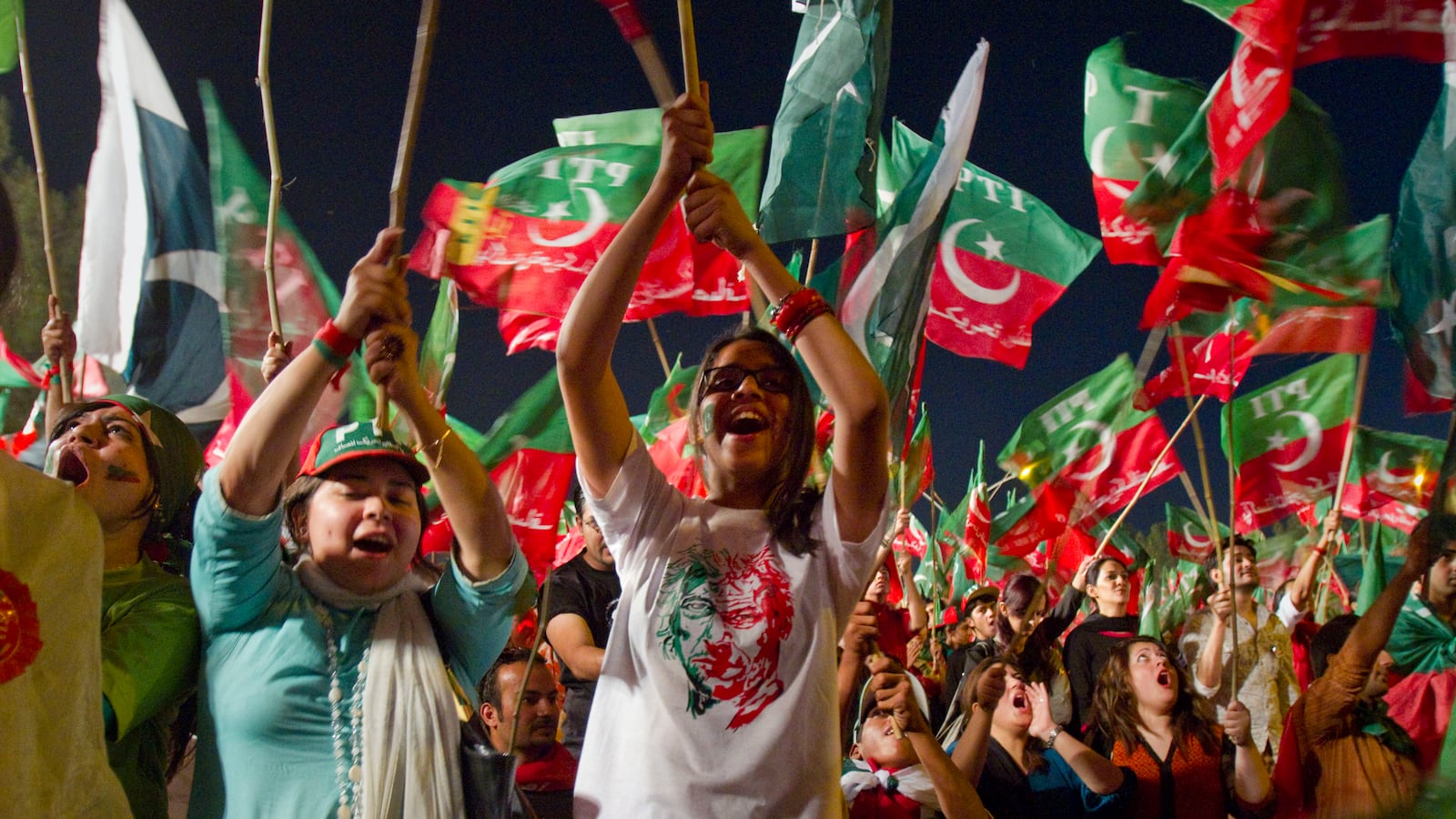May 11, 2013 will likely be a watershed moment in Pakistani politics. For the first time in its 66-year history, an election will transfer political power from one civilian government to the next. The often bleak landscape of economic woes, political paralysis, terror attacks, sectarian strife, and Taliban threats about democracy being “un-Islamic” did not prevent political parties from fielding candidates, and voters will likely not be intimidated to stay home en masse as election fever grips the country of 180 million.

All of the above is progress. American support for democracy, while not a consistent policy over time given the U.S.’s close links with the Pakistani military, has nonetheless been an important factor in the last decade in Pakistan in favor of civilian governments.
American mediation brought an end to General Pervez Musharraf's reign. Benazir Bhutto, head of the Pakistan People's Party (PPP), returned to a great welcome but a terrible assassination in 2007, which eventually after the 2008 election made her husband, Asif Ali Zardari, president. In these present-day elections, U.S. policy has been under attack and candidates eschew identification with American priorities in order to make their case for election.
While elections and the peaceful transfer of power is a U.S. interest in Pakistan, a number of issues of concern lie ahead. What comes next is critical. Will governance improve? Are economic factors going to make the life of the incoming government impossible? How will the country cope with the immense energy shortage that stymies economic opportunity for a restless nation? How will civil-military relations be managed? Will the new government prioritize the fight against terrorism in the face of the 40,000 plus Pakistanis who have lost their lives? What will be Pakistan's regional policy?
Washington is aware that the U.S. reputation today in Pakistan is at an all-time low. Many blame the anti-terror focus of the U.S-Pakistan relationship after September, 2001, for the many ills that have befallen their country. Personal safety and security inside the state are said to have been sacrificed by Pakistani leaders in order to do America's bidding.
Whoever emerges from the election with sufficient votes for a single political party to form the next government or even—a more likely scenario—a coalition, will need to focus on a "Pakistan First" campaign. That ought not to rile Washington, because a smooth U.S. troop withdrawal from Afghanistan requires a better understanding of Pakistani needs as well as Afghan-U.S. requirements.
Even beyond the withdrawal of troops from Afghanistan, U.S. has interests in Pakistan and a vital stake in its viability, stability, security, and prosperity. These goals will have to be kept in mind despite pressures and frustrations emerging from the election. There are four key areas where clashing priorities will need calm heads to prevail.
An early clash between Islamabad and Washington could come from the already announced intent of the likely two leading political parties, the Pakistan Muslim League of Nawaz Sharif (PMLN), and the Pakistan Tehreek-e-Insaf (PTI) led by Imran Khan, to launch a national dialogue involving all elements of society, including the Taliban. The Taliban, a source for Washington's frustration in terms of its Afghan strategy, could spur problems with the Obama administration and Congress, where support for Pakistan is in decline. Pakistani leaders will make their argument for engagement with the Taliban on the basis of the need for peace in Pakistan's cities and countryside.
A second early area of disagreement may come from Pakistan's pursuit of a natural gas pipeline from Iran to Pakistan. Iranian funding for its completion has obviated the need for U.S. support for construction funds. However, U.S. sanctions on Iran have led to pressure on Pakistan to forego cooperation with that country. That request runs into the reality of 20-hour blackouts in Pakistani cities, which makes normalcy nonexistent and economic activity impossible. Past U.S. efforts to assist Pakistan's energy sector have not led to progress given Pakistani governance issues and mismanagement of energy issues, including subsidies and theft.
Economic relief will be another early issue for the new government. With foreign reserves able to cover only two months of imports, Pakistan will look to the usual multilateral institutions for a relief package. Nawaz Sharif will point to his past record in restoring economic health and reform. Imran Khan does not have personal experience in governance, but has credibility with the people based on his anti-corruption campaign. He has acquired senior members who represent experience in financial and foreign affairs. For example, Shah Mehmood Qureshi, a former foreign minister, has experience in a variety of sectors from his time with the PPP. His friendship with Secretary of State John Kerry could make it easier to start the conversation.
U.S. policy in Afghanistan will be a tough area for engagement post-elections. Pakistanis strongly dislike the use of American drones. The U.S. presence on the border with Afghanistan, and what is perceived in Pakistan as the utterly unfair American pressure to "do more" against the militants without thought to what happens to Pakistan, could lead to frustration for Washington in the months ahead.
The Obama administration is already being pressed to involve itself in Syria and elsewhere. A smooth transition out of Afghanistan is important. Washington should look at the long term stability of the Pakistan-Afghan border and find ways to promote permanent peace between these two turbulent nations.
One idea, long overdue, is international recognition of the Durand Line as the official boundary between Pakistan and Afghanistan. The lack of a recognized border makes the strategy of preventing cross-border attacks impossible on the ground. There may not be peace on the border even with the Durand Line in place, but there is unlikely to be any chance for normalization between Pakistan and Afghanistan absent an international border demarcation.
Finally, if Pakistan is to have a chance for a more peaceful future, the U.S. needs to press its ally, Saudi Arabia, to end support for religious extremists who want to recreate Pakistan as a Wahabi State. The fact that Pakistan's religious parties remain marginalized at the polls means that the Pakistani population is not in favor of religious intolerance as the foundation for the state, even as the nation remains officially called the Islamic Republic of Pakistan.





